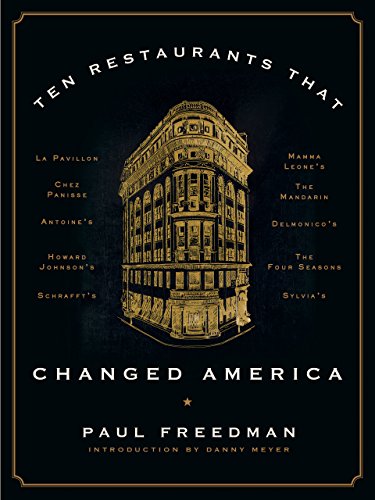I’m on the visionary panel. To register, click here.

Paul Freedman. Ten Restaurants that Changed America. Liveright/WW Norton, 2016.

I was happy to be asked for a blurb for this fascinating, entertaining, and beautifully produced (color illustrations!) volume. Here’s what I said:
Is it even remotely possible that ten restaurants—from Delmonico’s to Howard Johnson, Sylvia’s, and Chez Panisse—could change the way America eats? Paul Freedman draws on deep historical research, analysis of contemporary sources, and interviews with surviving players to give us an elegantly written, fascinating, and, dare I suggest, gossipy account of the individuals and social trends that made these restaurants famous. Whether or not you’ve ever eaten in any of these restaurants, you will have a wonderful time reading this book and will gain unexpectedly delightful insights into modern American life.
I particularly enjoy Freeman’s writing. Here is an excerpt from his chapter on Le Pavillion (page 336) on what it’s like to get into a high-end restaurant these days:
[I]t is hardly as if American high-end restaurants have become that much more democratic. Although it is customary to begin any account of the modern restaurant boom by conjuring up the bad old days of damask tablecloths, dress code, leather-covered menus and haughty maîtres-d’-hôtel, restaurants today impose distinctions that would never have occurred to Henri Soulé: near-impossible reservations, no reservations, the speakeasy restaurant type with no visible sign, special telephone lines for favored customers, or forcing clients to pay in advance of their meal. The model is no longer the nightclub of the Copacabana or El Morocco type, but the culinary version of a dance club complete with velvet rope and line of suppliants, lacking only a bouncer.
Freedman sprinkles wonderfully gossipy digressions throughout. Here’s one from his chapter on the Four Seasons (page 372):
President John F. Kennedy’s forty-fifth birthday on May 19, 1962, was celebrated there. Guests, who contributed $1,000, had a rather modest meal of baked crab, chicken broth with spring wheat, beef medallions and birthday cake. Kennedy had spent so much time chatting with each table, had time only for cream of asparagus soup and a beer before going off to Madison Square Garden where Marilyn Monroe sang him a rather suggestive version of “Happy Birthday.
That comment ought to take you right to YouTube, where you can the “suggestive version” for yourself.